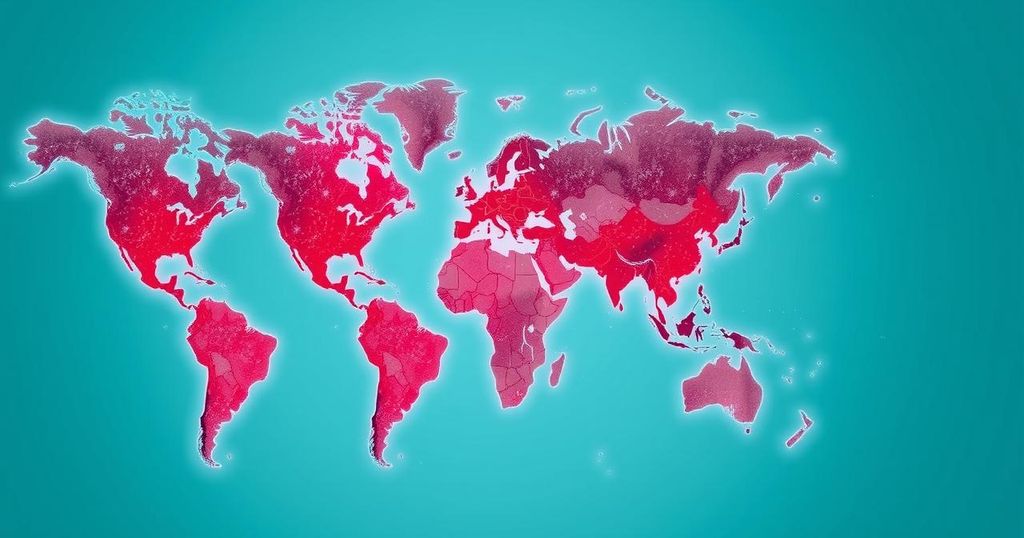World news
ASIA, CANADA, CDC, CENTRE FOR HEALTH AND HEALTHCARE, CLIMATE, CLIMATE CHANGE, DEMOCRATIC REPUBLIC OF CONGO, EUROPE, GERMANY, GLOBAL WARMING, INDIA, MPOX, NATURAL DISASTERS, NORTH AMERICA, OLIVER WYMAN, SHY, SHYAM BISHEN HEAD, SWEDEN, THAILAND, UNITED KINGDOM, UNITED STATES, WORLD ECONOMIC FORUM
Oliver Grayson
0 Comments
Key Global Health Challenges and Advancements in 2024
In 2024, significant global health issues included the impact of climate change, the resurgence of communicable diseases, advancements in generative AI, focus on women’s health inequities, workplace wellness, and the ongoing threat of antimicrobial resistance. Each topic reflects critical challenges and the need for coordinated action to improve global health outcomes.
In 2024, global health remained at the forefront of discussions, particularly during the World Economic Forum. The examination of critical health issues included the substantial impact of climate change, the resurgence of communicable diseases, advancements in technology within healthcare, the focus on women’s health, the intersection of work and health, and the ongoing threat of antimicrobial resistance. Each topic highlighted the complexities and challenges facing global health systems and the need for collaborative solutions.
The impact of climate change was reviewed in a 2024 report, revealing that failure to address this crisis could lead to significant health risks over the next two decades. Alarmingly, climate change is projected to result in an additional 14.5 million deaths and $12.5 trillion in economic losses globally by 2050. Increasing pathogens, pollution, and extreme weather events particularly threaten vulnerable populations lacking access to healthcare. Measures to bolster healthcare resilience were emphasized as vital to mitigating these risks.
The world also faced a remarkable uptick in infectious disease outbreaks in 2024, with measles cases rising by 20% globally, largely due to vaccine misinformation. The WHO addressed the declaration of a public health emergency for mpox following the emergence of a new strain, and dengue cases surged to over 12.7 million this year. These trends underscore the vital need for effective vaccination programs and public health awareness.
Generative AI emerged as a pivotal tool in healthcare, enhancing diagnostics and patient care experiences. Despite the advantages, disparities in resource availability between developed and developing regions hinder widespread adoption. Emphasis was placed on leveraging AI to streamline healthcare processes and reduce waste, illustrating an important intersection of technology and health.
Women’s health garnered significant attention, with reports indicating that, while women live longer, they experience more years in poor health compared to men. This gap has profound implications for societal productivity and health equity. Advocacy for women’s representation in health discussions is crucial for effective policy changes and improved health outcomes.
Workplace wellness also surfaced as an essential factor influencing public health, with a direct correlation between employee mental health and productivity. CEO insights highlighted the responsibility of leadership in fostering a supportive work environment that prioritizes mental health.
Lastly, antimicrobial resistance (AMR) continued to pose a daunting global threat. The United Nations convened a High-Level Meeting on AMR, setting ambitious goals for the reduction of drug-resistant infections. Given predictions that drug-resistant deaths could reach 169 million by 2050, prioritizing access to effective antibiotics is critical to combating this issue.
The health challenges of 2024 reflect broader trends related to climate change, public health crises, and technological advancements in healthcare. As climate change continues to reshape our environment, its effects on health are becoming increasingly pronounced, necessitating urgent action from health organizations and governments. The resurgence of infectious diseases, driven by issues such as misinformation and climate factors, reveals gaps in vaccination efforts and public health preparedness. Technological innovations, particularly in AI, offer new opportunities to enhance healthcare delivery, though disparities in capability must be addressed. The significant health inequities faced by women demand focused initiatives to address barriers to health equity. Additionally, workplace health initiatives highlight the need for a holistic approach to employee wellbeing, linking mental health to overall economic performance. Finally, antimicrobial resistance remains a critical concern requiring global cooperation and action.
In conclusion, the global health narratives of 2024 underscore an interconnected web of challenges that demand urgent attention. From the alarming implications of climate change on health to the resurgence of communicable diseases and the critical role of technology, each aspect calls for collaborative solutions. The pivotal focus on women’s health and workplace wellbeing reaffirms the significance of equitable health policies. Lastly, addressing antimicrobial resistance is imperatively linked to global health security, necessitating robust international efforts to safeguard the future of public health.
Original Source: www.weforum.org




Post Comment